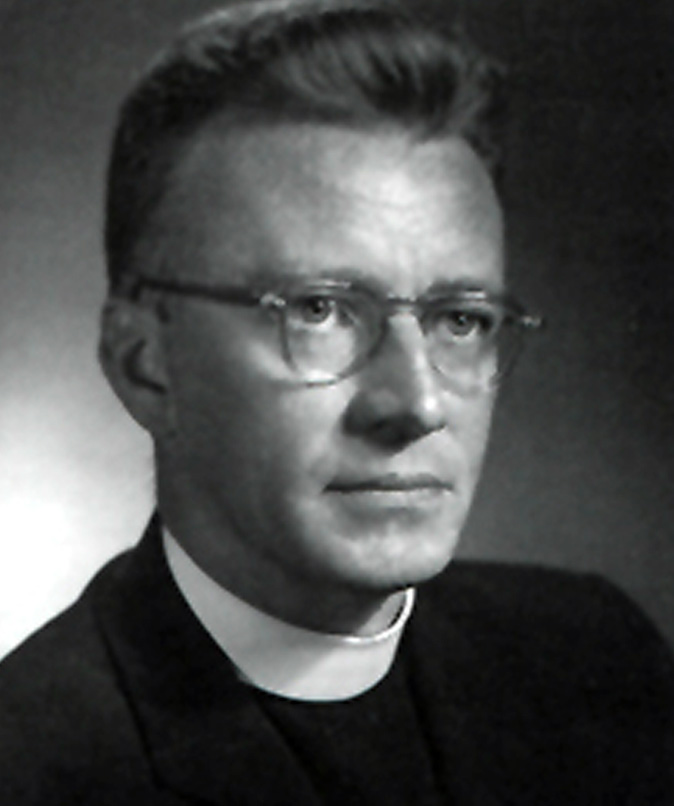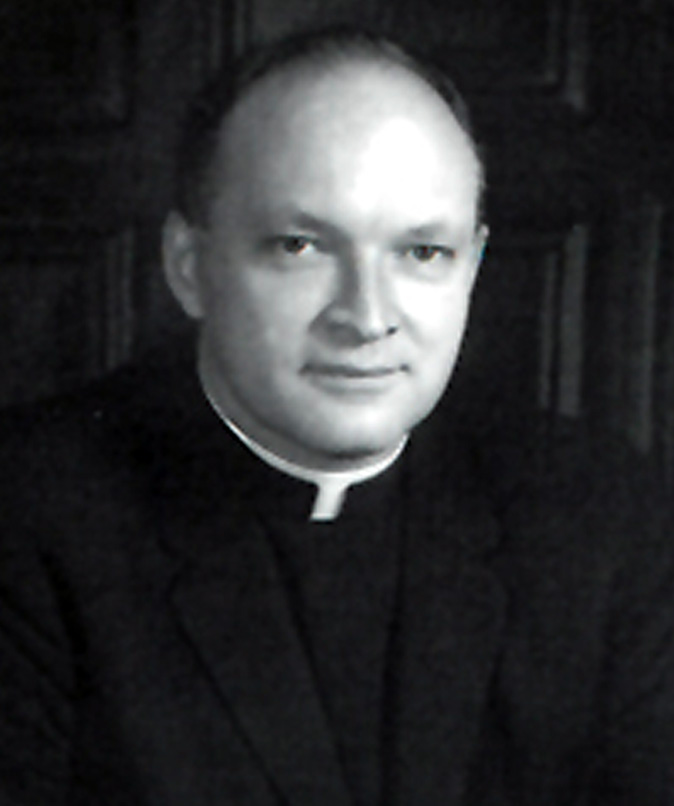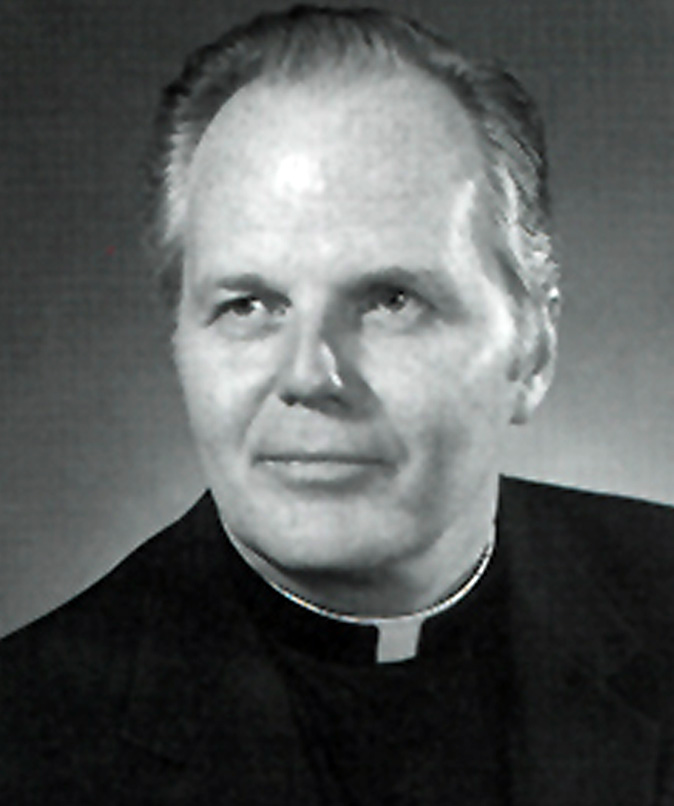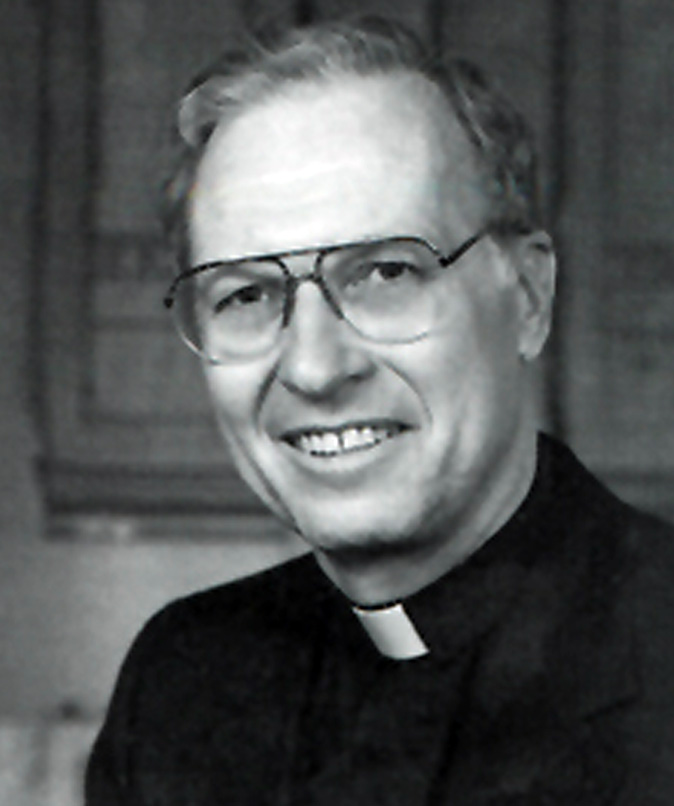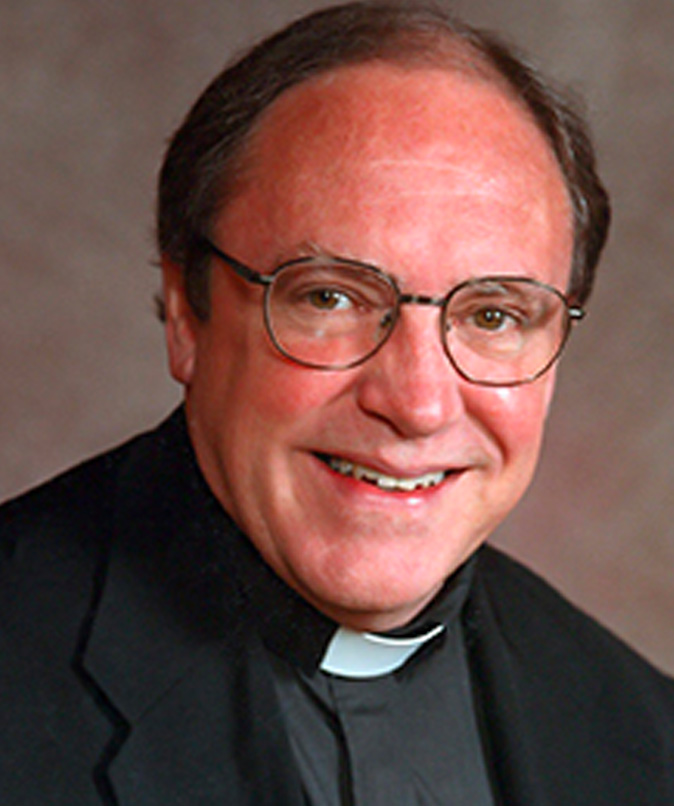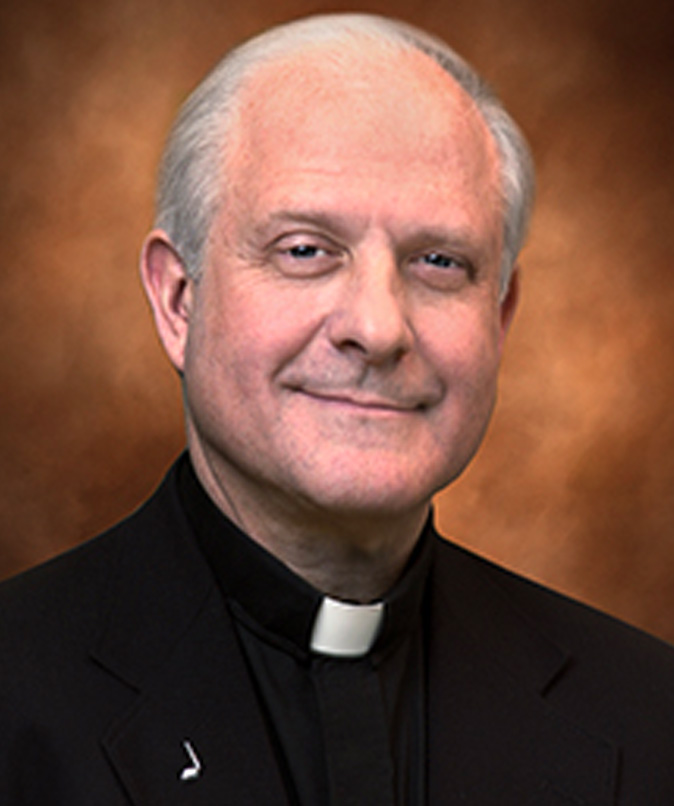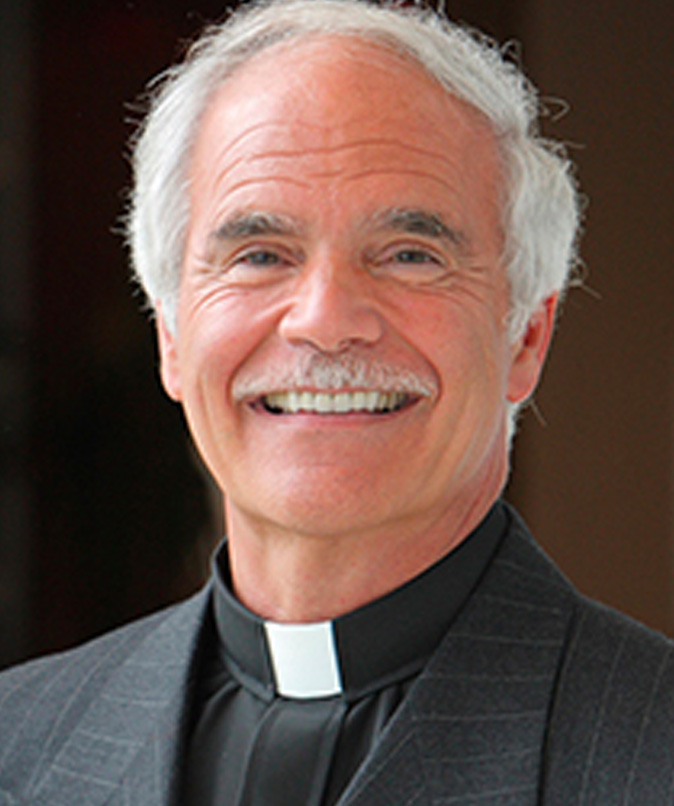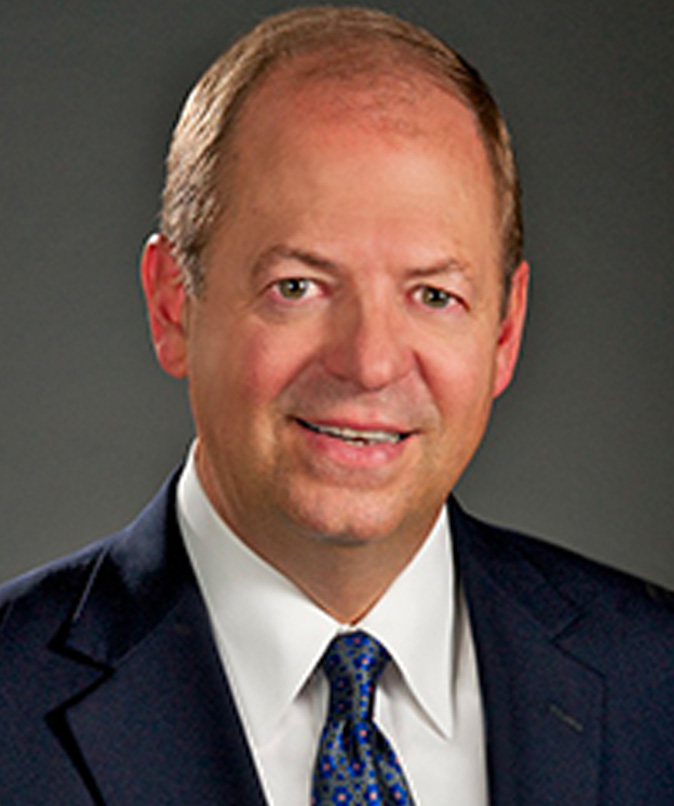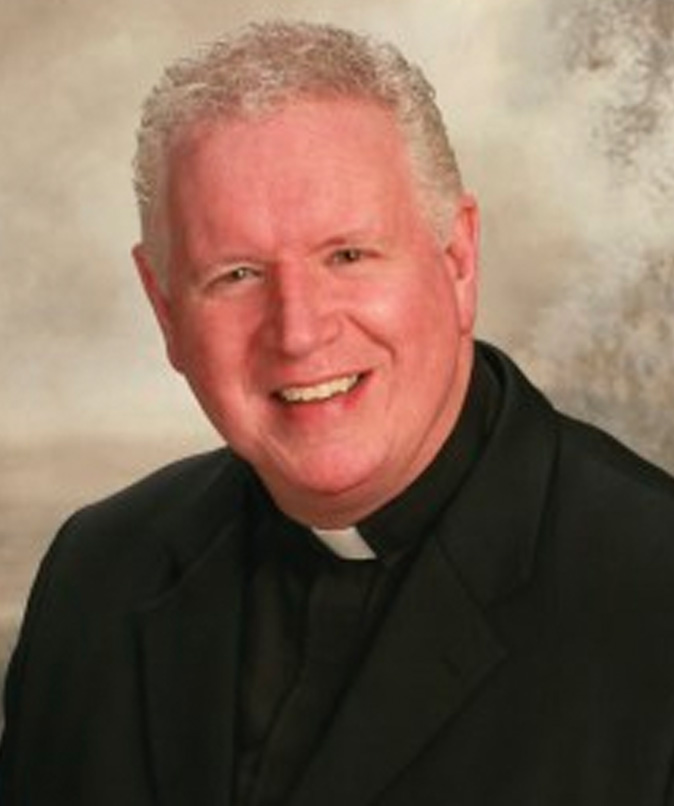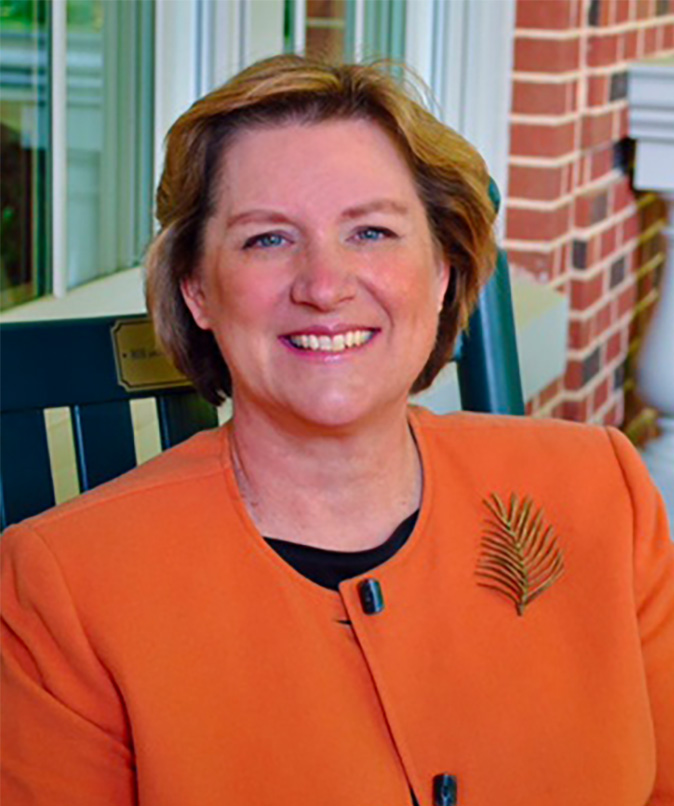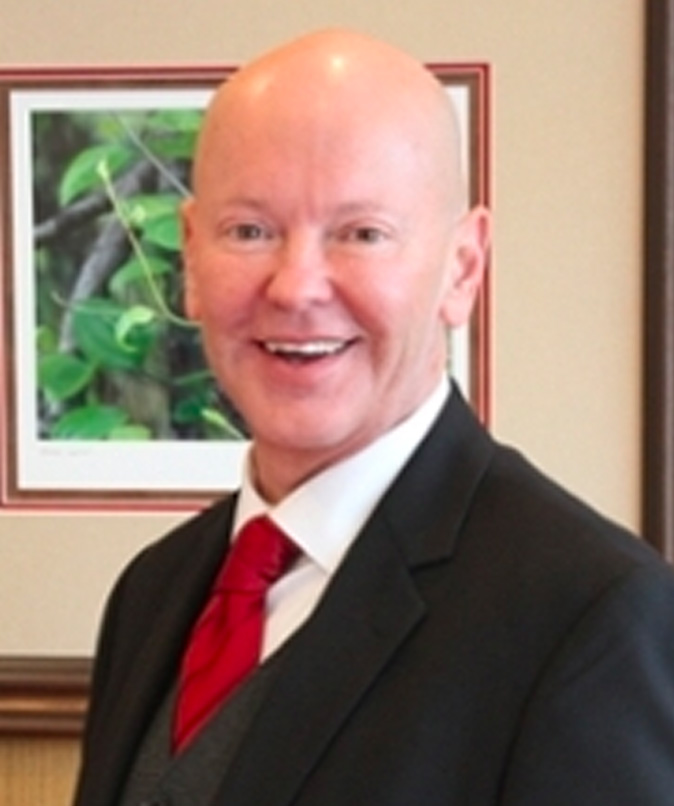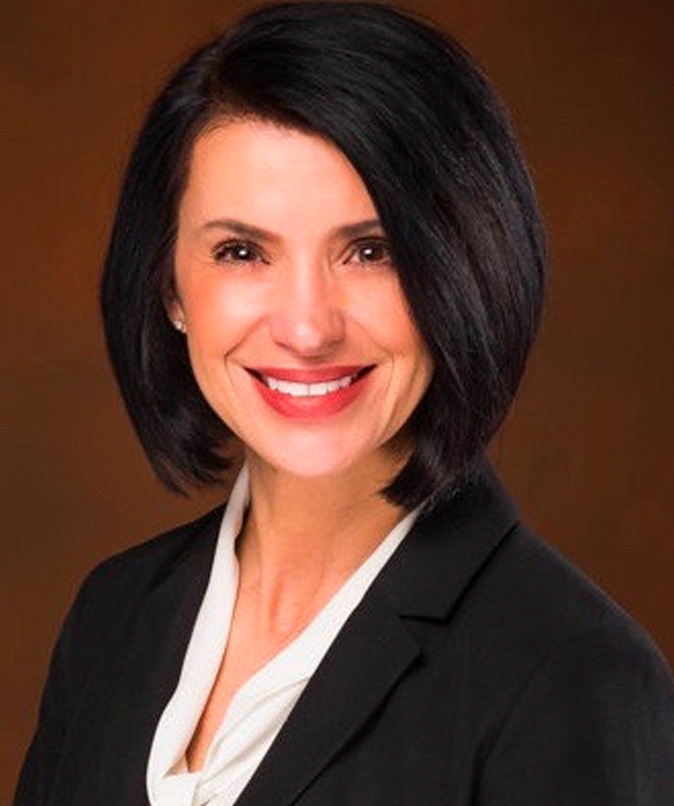Presidents
Rev. Lawrence R. McHugh, S.J.
1st President: September 26, 1954 – July 31, 1959
The Reverend Lawrence R. McHugh came the Wheeling in 1954 from Georgetown University. He originally assumed the position of vice-rector of the burgeoning Jesuit community, but soon discovered that he was to be the man responsible for creating what would later become Wheeling College.
Working with Bishop John J. Swint, Fr. McHugh was entrusted with the task of creating a college from 61 acres, three partially completed buildings, a handful of associates, and a budget of two million dollars. Building the college was not as an easy task, as costs mounted above the $2 million budget. McHugh and Swint consistently disagreed about priorities for the project. While McHugh insisted on modern, fully equipped laboratories, the Bishop thought a gymnasium would be more beneficial.
Ultimately, McHugh’s mission was successful and the college accepted its first 91 students (a year after McHugh’s arrival) on Sept. 26, 1955. McHugh was named the first president and vice rector of the college by the Rev. John Baptist Janssens, S.J., the Father General of the Society of Jesus on Sept. 25, 1954, the college official incorporation date. At the first commencement on June 1, 1959, 20 women and 31 men graduated. The speaker was Rev. Edward Bunn of Georgetown University. Fr. Bunn told McHugh, “Fifty years from now, in the history of Wheeling College, you will be remembered as its first President…however, only the ones who have borne the heat and burdens of the daily struggles will know all that went into its founding.” On July 31, 1959, McHugh was succeeded as president by Rev. William F. Troy, S.J.
Born in Baltimore, Maryland, on April 11, 1907, McHugh graduated from Loyola University in 1927. On August 14, 1927, he entered the Society of Jesus novitiate at St. Andrews-on-the-Hudson. McHugh also earned a Master’s degree in Philosophy from Woodstock University and served as regent (teaching scholastic) at St. Peter’s Preparatory School in Jersey City. He began his theology studies in Innsbruck, Austria, in 1936. Three years later, he was expelled by the Nazis, shortly after their annexation of Austria. He saw Adolph Hitler first-hand at a Nazi victory parade in Innsbruck in 1938.
After ordination as a Jesuit priest on June 21, 1939, he completed his Licentiate in Scared Theology, the highest degree available in the study of theology. McHugh served as counselor at Georgetown University until the outbreak of World War II. During the war, McHugh had a distinguished career as a Navy chaplain on two aircraft carriers in the Pacific and flew dive-bombers at Cecil Field in Jacksonville, Florida. After his discharge from the military, he returned to Georgetown as director of admissions and assistant dean of studies of the undergraduate schools.
Once his mission at Wheeling College was completed in 1959, he became director of the Greater St. Joseph’s Scholarship Fund and assistant to the president at St. Joseph’s College in Philadelphia. From 1959 to 1969, he served as vice president for college relations at St. Joseph’s before becoming chaplain at Philadelphia’s Miserecordia Hospital.
McHugh retired in 1983 and died on April 8, 1988 at the age of 80 in Philadelphia.
William F. Troy, S.J.
2nd President: July 31, 1959 – July 1966
Image of William TroyRev. William Francis Troy, S.J. was born on April 8, 1920, in Reading, Pa, and entered the Society of Jesus on August 14, 1937 at the age of 17. After receiving a Bachelor’s degree from Georgetown University, he attended Woodstock College where he earned a Master of Arts in teaching. He was ordained as a Jesuit priest in Woodstock, Maryland, on June 18, 1950. His first post as Jesuit was at Gonzaga High School in Washington, D.C. where he served as headmaster.
Father Troy came to Wheeling in 1955, beginning his dedicated involvement to the community. That year, he served as the first dean of faculty at Wheeling College. Then, on July 31, 1959, he became the second president of the College and served until summer of 1966. Troy quickly gained the reputation of a being direct and informal man. He would join students in sing-alongs and games of charades; he would drive himself around campus in a noisy, rusted-out maintenance truck; and he encouraged students to drop by his office to converse with him on a regular basis.
During his time as president of the college, Father Troy oversaw the building of the opening of two dormitories (McHugh and Sara Tracy), and, later, three small student residences. Under his leadership, the College first received accreditation without reservation from the North Central Association of Colleges and Universities, summer school classes were first begun, and the construction of the gymnasium was completed. Shortly before his departure from the College, Tory also announced a $5 million expansion program, intended to provide funds for a library, campus center, theater, and two additional residence halls. Perhaps Troy’s most significant contribution to the College may have been his dedication to liberal arts objectives within a very strong collegial setting.
While residing in the Wheeling area, he also served as president of the Wheeling Area Conference on Community Development and Oglebay Institute. Additionally, he was on the board of the Iroquois Council of Boy Scouts, United Fund and Community Chest of Wheeling.
On the state level, he was the vice-president of the West Virginia Association of Colleges and University Presidents and of the West Virginia Foundation for Independent Colleges. Fr. Troy was also a sportsman and served as the President of the West Virginia Intercollegiate Athletic Conference and the Wheeling Area Conference.
Troy left Wheeling in 1966 to work in Baltimore, Maryland, at the Jesuit order regional headquarters. At the Baltimore headquarters, he directed the career preparations and graduate studies of 300 to 400 young Jesuits.
Troy died on November 14, 1967 at the Gonzaga Villa in Cape May, New Jersey. He was 47 years old. He was remembered by his successor, Fr. Frank R. Haig, S.J., who said, “I suppose one could say Fr. Troy was first of all a priest, a religious leader, who felt his job was to advance the development of Wheeling. Most of all, he was considerate, kind and gentle. We will miss him.”
Rev. Frank R. Haig S.J., Ph.D.
3rd President: July 15, 1966 – August 21, 1972
Image of Frank HaigA member of the physics department since 1963, Rev. Frank Rawle Haig, S.J., became the third president of Wheeling College on July 15, 1966. “The world will be what our men and women of insight make it to be,” Fr. Haig said at his inauguration. “It is a challenge to be asked to help them see all right.”
Fr. Haig established the first Faculty Council, providing faculty a formal channel with which to interact with the administration, and approved the “open university” concept that allowed students to explorer topics not covered in the college’s curriculum. Fr. Haig also recognized the importance of forming connections with people, businesses and other institutions in the Wheeling area, and accepted the challenges of creating these bonds. His leadership built many bridges that have served the college well during ensuing years.
He was born Sept. 11, 1928 in Philadelphia, Pa. Immediately after graduating from Lower Merion Senior High School, he entered the Jesuit order at Wernersville, Pa. he earned an A.B. from Woodstock College in Woodstock, Md., in 1952; a Ph.L. from Bellarmine College in Plattsburgh, N.Y., in 1953; and a Ph.D. in theoretical physics from Catholic University in 1959/ He also earned an S.T.L. from Woodstock in 1961, the year he was ordained.Fr. Haig is the brother of Alexander M. Haig, who was a member of President Ronald Reagan’s cabinet and served as a military advisor to President Richard Nixon.
After completing a year’s fellowship at the University of Rochester, Fr. Haig joined the physics department at Wheeling College. On August 21, 1972 he left the presidency in Wheeling and moved to Baltimore, Md., to be a visiting fellow in the Johns Hopkins University Department of Physics. He joined the department of physics, engineering and computer science at Loyola College in Baltimore in 1972, and served as department chair during the 1980-81 academic year.
From 1981-87, Fr. Haig was president of Le Moyne College in Syracuse, N.Y., after which he rejoined the Physics Department at Loyola College. He is now considered professor emeritus there.
In recent years, Fr. Haig has served terms on the Scientific and Educational Council of the Maryland Academy of Science, as treasurer of the Washington Academy of Sciences and has presented papers and lectures both in the United States and abroad.
At Wheeling Jesuit, the universities highest science award is named for him and is presented to seniors at every spring commencement.
Rev. Charles L. Currie Jr., S.J., Ph.D.
4th President: August , 1972 – June 1982
The Rev. Charles L. Currie, Jr. served as the fourth president of Wheeling College from August 1972 until June 1982, a time of great financial difficulty and declining enrollment for the school. His arrival was greeted by rumors that he planned to close the College, but, instead, he committed himself to building on the goals of the original founders and to expanding the impact of the college on the Ohio Valley.
Currie engineered the first needed boost in funding through the Title III (Advanced Institutional Development Program), which brought the college $1.5 million in federal funds from 1976-81. Along with supplementary funds from the Benedum Foundation (in business) and the Health, Education and Welfare Health Resources Division (in nursing), the College was able to establish new programs, increase student retention rates, provide funds for faculty and administrative development, and develop a strong data-based management system, including computer capabilities.
After five years, Wheeling College gained distinction as one of the few schools in the nation to quit the Title III program on a voluntary basis. Fr. Currie finished his tenure as president with an 80 percent increase in enrollment, gifts from private sources reaching $1 million per year, an evening division, and 12 new programs. Although the College still had a $1 million debt by the time he left, Currie was able to balance the yearly budget.
Born on July 9, 1930 in Philadelphia, Fr. Currie began his collegiate education at Fordham University in 1948 on a Presidential Scholarship, and studied there until 1950, when he entered the Society of Jesus. Beginning an impressive career in higher education, Fr. Currie received his Bachelor of Arts from Boston College in 1955, followed by his Master in Arts in 1956. That same year, he also earned his PhL from Weston College. In 1961, he completed his doctoral work for his PhD in Physical Chemistry at Catholic University, working in the area of photochemistry. Two years after the completion of his PhD, Fr. Currie was ordained a Jesuit priest on June 16, 1963.
After leaving Wheeling College in 1982, Fr. Currie became president of Xavier University in Cincinnati. In 1986, he returned to Georgetown University to direct the school’s bicentennial celebration. After the assassination of Jesuits priests in El Salvador in 1989, Fr. Currie was appointed special assistant to coordinate the University’s response to this tragedy. In this capacity, he traveled to El Salvador to observe the situation first-hand, organized a number of educational programs at Georgetown, and participated in the Congressional response to the situation. In 1991, he was one of three official representatives from the U.S. Jesuits at the trial of the soldiers accused of the murders.
After completing his work at Georgetown, Fr. Currie then moved to St. Joseph’s University in Philadelphia, where he served as rector of the Jesuit community and taught courses in theology and science. In 1997, Fr. Currie’s background in higher education led to his appointment as the president of the Association of Jesuit Colleges and Universities (ACJU), an organization dedicated to promoting cooperative efforts among the 28 Jesuit institutions in the United States. He left that position in 2011 and was the longest president ever in the history of the AJCU. He currently serves as Executive Director of the Jesuit Commons.
Rev. Thomas S. Acker, S.J., Ph.D.
5th President: July, 5, 1982 – July 31, 2000
The Rev. Thomas Stephen Acker, S.J. served as the fifth president of Wheeling Jesuit University (WJU), succeeding the Rev. Charles Currie, S.J. in July 1982.
Philip Kirby, former Chairman of the WJU Board of Directors, referred to Fr. Acker as the “second founder” of the university. Considering the remarkable growth and development the University underwent during Fr. Acker’s presidential tenure, Kirby’s sentiments are easily understood.
Fr. Acker’s inauguration on November 8, 1982 was presided over by Bishop Joseph Hodges. Fr. Acker spent the next 18 years as president of the university, longer than anyone else in the WJU’s history. By the time Acker’s presidency came to an end on July 31, 2000, the University achieved a 50% increase in enrollment, (from 988 in 1982 to 1,527 in 1999), the construction of $50 million worth of new facilities, a doubling of the school’s square footage, and the establishment of an evening program. U.S.News and World Report consistently ranked WJU as one of the best small colleges in the southern United States.
Acker’s first building project was the Chapel of Mary and Joseph in 1984, constructed with donations from the McDonough and McShain families, but these new buildings were only the beginning. The renovation of Donahue Hall and the addition of other buildings, including Ignatius Hall and the McDonough Center, followed over the next 15 years. Existing buildings, including the Hodges Library and Swint Hall, also underwent extensive renovations. The university added three federally funded facilities including the Robert C. Byrd National Technology Transfer Center, the Erma Ora Byrd Center for Educational Technologies, and the Alan B. Mollohan Challenger Learning Center.
The physical plant of the university was not the only component that saw change under Acker’s leadership. When Acker first began his position, the school was still known as Wheeling College. In 1986, he announced plans to add “Jesuit” to the name, with the WJU Board of Directors making the change official during the 1987-1988 school year. In June of 1996, the school’s name was changed once more, to Wheeling Jesuit University.
Born July 21, 1929, Fr. Acker, a native of Cleveland, Ohio, earned a bachelor’s degree in Classical Language and a licentiate in philosophy from Loyola University. He received a PhD in biology from Stanford University in 1961 before being ordained a Jesuit priest at the age of 33. After completion of his higher education, he spent two and a half years working in the country of Nepal, first as a Fulbright professor (1972-1974) and then as Project Director (1974-1975) of the U.S. Peace Corps. His efforts in Nepal helped to completely revamp the nation’s educational programs.
After completing his service in Nepal, Fr. Acker taught at John Carroll University, the University of Detroit, and San Francisco University. His academic administrative experience began at St. Joseph’s University in Philadelphia, Pennsylvania where he served as Dean of Arts and Sciences. While contemplating another foreign mission, where he could devote his skills to helping the less fortunate, Fr. Acker discovered the opening at WJU and actively pursued the position.
Fr. Acker’s remarkable career at WJU has been recognized numerous times. Daniel Goldin, the Administrator of the National Aeronautics and Space Administration (NASA), awarded Acker NASA’s Distinguished Public Service Medal, the highest honor the agency awards a civilian. In 2000, West Virginia Governor Cecil Underwood also presented Fr. Acker with the Distinguished West Virginian Award for his service to the state over the years. On July 27, 2002, Fr. Acker was given the opportunity to give the opening prayer for United States Senate. After Fr. Acker delivered the prayer, Senator Robert C. Byrd spoke extensively about Acker’s contributions to the state of West Virginia. Finally, the University conferred president emeritus upon Acker, and named the university science center in his honor.
After his departure from WJU, Fr. Acker was appointed executive director of Forward Southern West Virginia Inc. in Beckley. This economic development organization is devoted to improving various aspects of the state’s 17 southernmost counties, an area typically regarded as the most undeveloped in the state. Fr. Acker currently works for the Diocese of Youngstown, Ohio as a Parish Administrator.
Rev. George F. Lundy, S.J., Ph.D.
6th President: July 31, 2000 – July 31, 2003
Rev. George F. Lundy, S.J. assumed duties as the sixth president of Wheeling Jesuit University on July 31, 2000. Lundy brought 30 years of professional experience in education to his new post.
Lundy, a Chicago native, joined the Society of Jesus at 19. He earned an A.B. in sociology from Loyola University of New Orleans. Lundy received a master of divinity degree from Loyola University of Chicago and a Ph.D. in educational administration from the University of Chicago.
Before coming to Wheeling Jesuit, Lundy served as the academic vice president and provost of the University of Detroit Mercy from 1995 to July 2000. Lundy served in numerous positions, including acting president, interim vice president for academic affairs and senior vice president/dean of faculties. He also served as the director of the Loyola University, New Orleans Institute of Human Relations. During that time, Lundy taught courses with the Institute’s Labor Studies Program.
Throughout his career, Fr. Lundy worked on a wide range of social issues form the death penalty to public policy on nutrition. He helped establish the Loyola (New Orleans) Death Penalty Resource Center, which led him to testify in numerous death penalty cases. His work appears in the book Dead Man Walking.
Lundy left WJU on July 31, 2003 to assume a position in the New Orleans Province of the Society of Jesuit.
Lundy died of a stroke on Dec. 20, 2011 at age 64 in New Orleans. He is buried in St. Charles College in Grand Coteau, Louisiana.
Rev. Joseph R. Hacala, S.J.
7th President: July 31, 2003 – September 16, 2006
Rev. Joseph R. Hacala, S.J. was well known in the WJU community before he was named the seventh president. Hacala was born on Feb. 28, 1945 and was one of very few West Virginia born Jesuits. He first arrived in Wheeling in 1975 as the Coordinator of Appalachian Ministries. He left briefly, and later returned in 1980 as rector of the Jesuit Community. He led the presidential search committee in 1981 when Fr. Currie announced his resignation to be president at Xavier University in 1982. Hacala then left WJU again in 1984.
Hacala returned to WJU in 2001 to be the rector of the Jesuit community again under President Lundy, and later assumed the duties as president July 31, 2003.
During his presidency, Hacala created the Clifford M. Lewis, S.J. Appalachian Institute, stressing the need for a service learning component at WJU and restructured most of the university’s debt. Hacala was heavily involved in the university’s 50th anniversary celebration during the 2004-05 academic year.
Hacala resigned as president on Sept. 16, 2006 after being diagnosed with amyloidosis, a rare disease. He died five months later on Feb. 19, 2007 at the age of 61. He is buried in the Jesuit Cemetery in Wernersville, Pennsylvania.
Rev. Julio Giulietti, S.J., Ph.D.
8th President: August 13, 2007 – August 5, 2009
Rev. Julio Giulietti was selected as the eight president of WJU in February 2007, but did not assume the duties until August.
Giulietti was born April 29, 1946 and grew up in New York and entered the Society of Jesus in 1972. He acquired advanced degrees in comparative religions and counseling and a doctorate in theology. He worked at a variety of institutions focusing on international programs and higher education, and as director of the Center for Ignatian Spirituality at Boston College.
At Wheeling Jesuit, Fr. Giulietti sought to bring international students to Wheeling, creating agreements that allow people in other countries to benefit from WJU’s health science programs. After leaving WJU in August 2009, Fr. Giulietti was appointed director of the Loyola in Vietnam program by Loyola University in Chicago.
Richard Allen Beyer
9th President: January 1, 2011 – June 30, 2013
Rick Beyer, a successful business executive, was chosen as the ninth president of Wheeling Jesuit University in October 2010. He had over 23 years of senior executive office experience and more than 16 years of experience in higher education, including board governance, strategic planning and financial modeling, before joining WJU.
Born April 12, 1957, during his presidency, he initiated a university strategic planning process. Enrollment reached record levels, alumni and corporate support significantly increased, and new fine arts, engineering and health sciences programs were established.
He previously served on the board of trustees at the American University in Washington, D.C. was chairman of the board of trustees for his alma mater, Olivet College in Michigan, and is a member of the board of directors at the Association of Governing Boards of Universities and Colleges (AGB), a national higher education governance organization.
Beyer was the first non-Jesuit president to serve at WJU.
Rev. James J. Fleming, S.J., Ph.D.
10th President: July 1, 2013 – January 3, 2017
Prior to becoming the university’s tenth president, Rev. James J. Fleming, S.J., Ph.D. served as executive vice president under ninth WJU President Richard A. Beyer.
Before joining Wheeling Jesuit in July 2010, Fr. Fleming was on staff at Boston College for ten years. He served as director of mission planning and assessment from 2004-2010, where he developed and oversaw the implementation of a strategic planning process for the office. From 2000-2004, he was an assistant professor in the Lynch School of Education.
The author of numerous articles and publications, Fleming earned a Ph.D. in educational policy analysis at the University of California, Berkeley in 1999, where he was awarded the Wilson Research Fellowship and the Edgar and Camilla Morphet Fellowship.
Fleming was born Feb. 20, 1960 and entered the Society of Jesus in 1983 and was ordained a priest in 1995. As a Jesuit educator, Fleming has dedicated his life to academic investigation, service to and with the poor and spiritual reflection. He follows in a long line of Jesuits dedicated to bringing their academic and spiritual preparation to the Upper Ohio River Valley.
Dr. Debra Townsley
11th President: January 2017 – July 15, 2018
Prior to becoming the University’s 11th president, Dr. Debra Townsley served as the president of Williams Peach University in Raleigh, N.C. for the last five years. She has also served as president of Nichols College in Dudley, Mass. Overall, she has more than 30 years experience working in higher education.
Dr. Townsley has a doctorate in industrial/organizational psychology from the University of Vermont, where she also received a master’s degree in psychology. She earned a second master’s from George Washington University in Washington, D.C. and bachelor’s degrees from American University.
Dr. Michael P. Mihalyo, Jr.
12th President: August 2018 – October 2019
Michael P. Mihalyo, Jr., D.M.A., became the 12th president of Wheeling Jesuit University in August 2018. He joins Wheeling Jesuit with a diverse background in higher education that spans more than 20 years. Most recently, Dr. Mihalyo served as provost and vice president of academic affairs at Rockford University in Rockford, Illinois.
Dr. Mihalyo’s appointment returns him to the Ohio Valley. Prior to Rockford, Dr. Mihalyo was the president of the Kentucky-based Appalachian College Association as well as the president, chancellor, and provost at Davis & Elkins College in Elkins, West Virginia. He also served as the vice president for academic affairs and as a faculty member at Bethany College in Bethany, West Virginia.
Dr. Mihalyo also has familial ties to the University. His sister, Kimberly Mihalyo Abdalah, is a member of the class of 1995 and a member of the WJU Athletic Hall of Fame. Kimberly’s husband, Dr. Marvin Abdalah, M.D., is a member of the class of 1994 and a member of the WJU Athletic Hall of Fame. Dr. Mihalyo’s niece, Molly Metcalf, is also a member of the class of 2017.
Dr. Mihalyo earned his bachelor’s and master’s degrees, both in piano performance, from Duquesne University, and he holds a Doctor of Musical Arts degree from West Virginia University.
Ginny R. Favede
13th President: October 2019 – May 2024
Ginny R. Favede became the 13th President of Wheeling University in October of 2019. Prior to her appointment, Ms. Favede was elected to serve as the Chair of the University Board of Trustees in July of that year. Favede’s installation as President reinforces Wheeling University’s ongoing commitment to providing students with a high-quality educational experience that is founded on long-standing liberal arts principles of curiosity and empathy, and on the lifelong values of an independent Catholic institution.
Ms. Favede joins Wheeling University after a highly respected and successful career in public service. She most recently was the Executive Director of the Ohio Valley Construction Employers Council, a tri-state contractor’s association, as well as the Co-Chairwoman of Project Best, a construction industry labor-management organization encompassing over five hundred contractors and six thousand building trades craftsman and apprentices serving the Upper Ohio Valley region including Ohio, West Virginia and Pennsylvania. In 2017, Favede was appointed by Governor Jim Justice to the West Virginia Design-Build Board and is a member of the Executive Board of Directors for the Ohio Democratic Party.
Favede is a graduate of The Ohio State University, where she earned a BA in Political Science. She served as the Belmont County Commissioner for the last eight years and five years as a City of St. Clairsville Councilwoman, achieving a demonstrated record of growth, innovation and leadership. Under Ginny’s guidance, Belmont County, along with Marshall and Ohio Counties of WV, was noted as the fifth-fastest growing economy in the nation by the U.S Department of Commerce.
Favede served as an advocate at the state level serving as the 2nd Vice President of the County Commissioners Association of Ohio Executive Board of Directors and on the national level as the Vice Chair of the Community, Economic and Workforce Development Committee of the National Association of Counties (NACo). Favede also served as the vice chair of the CCAO Taxation & Finance Committee, co-chair of the CCAO Deferred Compensation Committee and Chairperson of the Belmont Records Commission, Jefferson Belmont Solid Waste Authority and the Belmont County Land Reutilization Corporation. She is a 2010 graduate of The National Association of Counties Leadership Institute and a graduate of the Ohio Municipal League Municipal Training Academy.
Ginny is one of the leading champions for women in leadership in the Ohio Valley serving as a member of the OUE Women in Leadership Board. Ginny is known for her advocacy efforts on behalf of children, seniors and veterans. She was recognized for her commitment to those serving in the military with the “Patriot Award” and the “Freedom Award” from the Department of Defense’s ESGR for her work on behalf of employees in the military service.
Favede also received the Ohio Public Images Merit Award for her advocacy on behalf of children with disabilities. In 2011, Favede collaborated with BCJ&FS and the Board of BCBDD to establish the Belmont County Harmony House, a children’s advocacy center, to improve the community’s response to child abuse. Ginny received an Ohio History Connection’s State Historic Preservation Office Award in recognition for her work on the historic Belmont County Sheriff’s Residence. The Wheeling News Register named Ginny one of the “40 Under 40 Most Influential People.”

